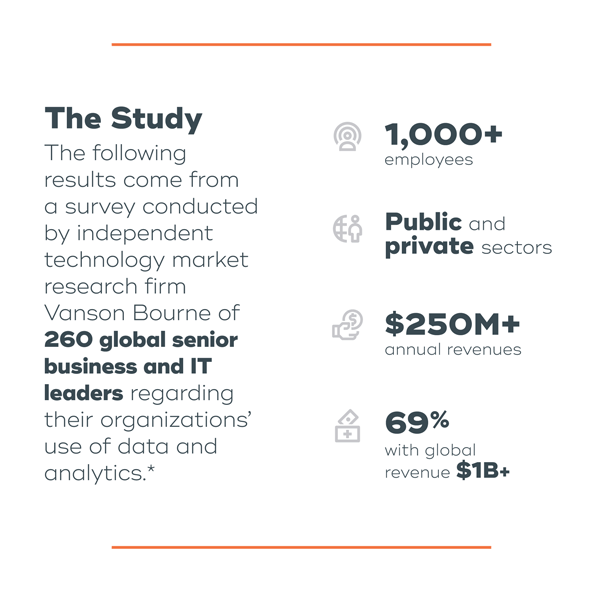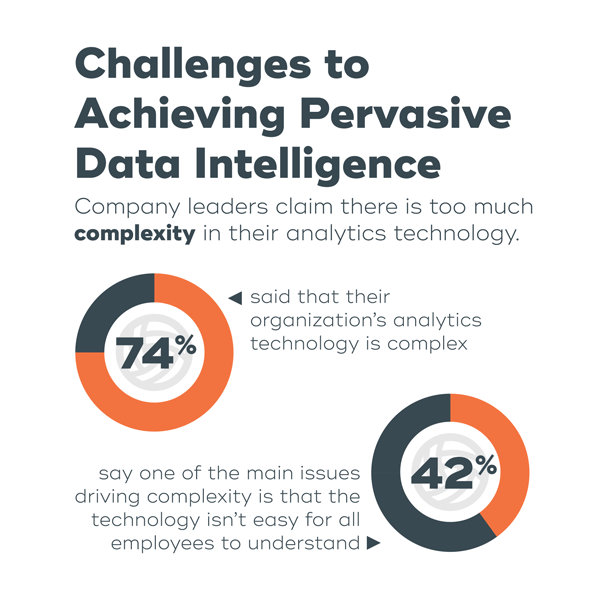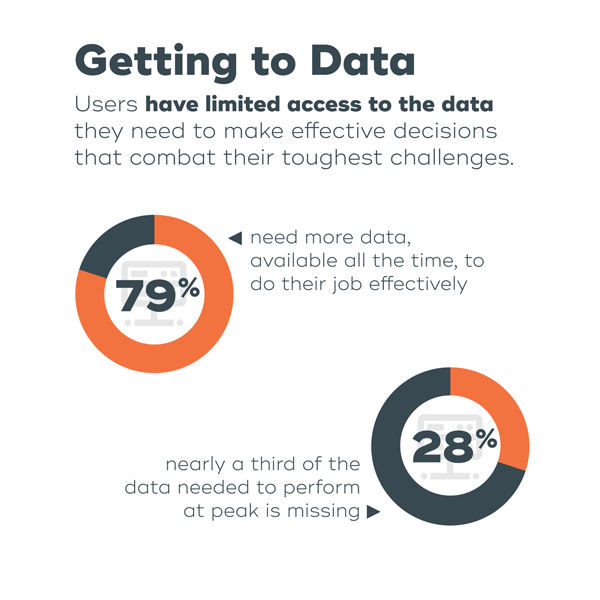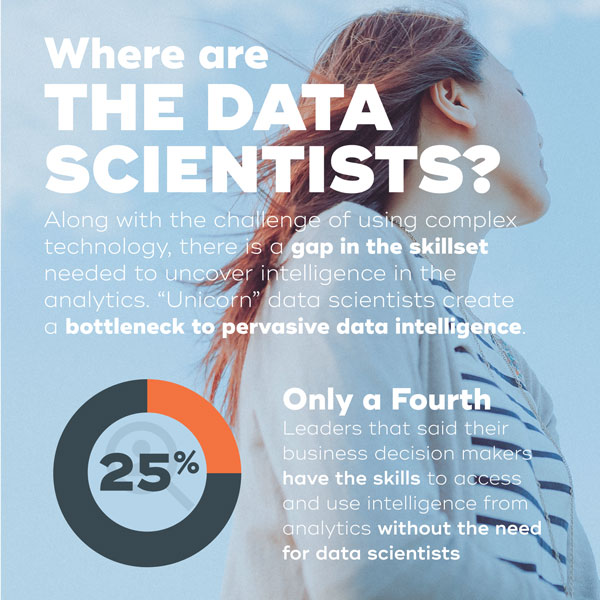15 oct. 2018 | SAN DIEGO
Global Survey: Analytic Insights Remain Trapped in Complexity and Bottlenecks
As companies aggressively invest in a future driven by intelligence – rather than just more analytics – business and IT decision makers are increasingly frustrated by the complexity, bottlenecks and uncertainty of today’s enterprise analytics, according to a survey of senior leaders at enterprise-sized organizations from around the world.
The survey, conducted by independent technology market research firm Vanson Bourne on behalf of Teradata (NYSE: TDC), the industry’s only pervasive data intelligence company, found significant roadblocks for enterprises looking to use intelligence across the organization. Many senior leaders agree that, while they are buying analytics, those investments aren’t necessarily resulting in the answers they are seeking. They cited three foundational challenges to making analytics more pervasive in their organization:

- Analytics technology is too complex: Just under three quarters (74 percent) of senior leaders said their organization’s analytics technology is complex, with 42 percent of those saying analytics is not easy for their employees to use and understand.
- Users don’t have access to all the data they need: 79 percent of respondents said they need access to more company data to do their job effectively.
- “Unicorn” data scientists are a bottleneck: Only 25 percent said that, within their global enterprise, business decision makers have the skills to access and use intelligence from analytics without the need for data scientists.
“The largest and most well-known companies in the world have collectively invested billions of dollars in analytics, but all that time and money spent has been met with mediocre results,” said Martyn Etherington, Teradata’s Chief Marketing Officer. “Companies want pervasive data intelligence, encompassing all the data, all the time, to find answers to their toughest challenges. They are not achieving this today, thus the frustration with analytics is palpable.”
Overly Complex Analytics Technology
The explosion of technologies for collecting, storing and analyzing data in recent years has added a significant level of often paralyzing complexity. The primary reason, cited in the survey, is that technology vendors generally don’t spend enough time making their products easy for all employees to use and understand. This problem is further exasperated by the recent surge and adoption of open source tools.

- About three quarters (74 percent) of respondents whose organization currently invests in analytics said that the analytics technology is complex.
- Nearly one out of three (31 percent) say that not being able to use analytics across the whole business is a negative impact of this complexity.
- Nearly half (46 percent) say that analytics isn’t really driving the business because there are too many questions and not enough answers.
- More than half (53 percent) agree that their organization is actually overburdened by the complexity of analytics.
- One of the main drivers of this complexity is that the technology isn’t easy for all employees to use or understand (42 percent).
Limited Access to Data
The survey further found that users need access to more data to do their jobs effectively. Decision makers and users understand that more data often leads to better decisions, but too often, a lack of access to all the necessary data is a significant limiting factor for analytics success. According to the survey, decision makers are missing an average of nearly a third of the information they need to make informed decisions – an unacceptable gap that can mean the difference between market leadership and failure.

- 79 percent of senior leaders said they need access to more company data to do their job effectively.
- On average, respondents said they are missing nearly a third (28 percent) of the data they need to do their job effectively.
- 81 percent agree that they would like analytics to be more pervasive in their organization.
- More than half (54 percent) of respondents said their organization’s IT department is using analytics, compared to less than a quarter (23 percent) who said that the C-suite and board level are doing so.
Not Enough Data Scientists
Finally, “unicorn” data scientists remain a bottleneck, preventing pervasive intelligence across the organization. Respondents see this as an issue and connect the problem to the challenge of using complex technologies. To combat it, the vast majority say that they are investing, or plan to invest, in easier-to-use technology, as well as in training to enhance the skills of users.

- Only 25 percent of companies said their business decision makers have the skills to access and use intelligence from analytics without the need for data scientists.
- Nearly two thirds (63 percent) of respondents from organizations that currently invest in analytics agreed that it is difficult for non-analytics workers to consume analytics within their organization.
- In 75 percent of respondents’ companies, data scientists are needed to help business decision makers extract intelligence from analytics.
- To reduce this over-reliance on data scientists, 94 percent of respondents’ businesses where data scientists are currently needed, are investing – or plan to invest – in training to enhance the skills of users; while 91 percent are investing – or plan to invest – in easier-to-use technology.
About the survey:
The global survey was conducted in August and September 2018 among 260 senior business and IT decision makers in the Americas, Europe and Asia Pacific. Respondents’ organizations had 1,000 employees or more, were from any public or private sector, and had a global annual revenue of $250 million or more (with 69 percent of respondents from companies with at least $1B in global annual revenue).
Interviews were conducted online or via telephone using a rigorous multi-level screening process to ensure that only suitable candidates were given the opportunity to participate.
Download the full report at teradata.com.
About Vanson Bourne
Vanson Bourne is an independent specialist in market research for the technology sector. Their reputation for robust and credible research-based analysis is founded upon rigorous research principles and their ability to seek the opinions of senior decision makers across technical and business functions, in all business sectors and all major markets. For more information, visit www.vansonbourne.com.
Chez Teradata, nous sommes convaincus que l’accès à de l’information fiable est un facteur de réussite pour les individus. Notre plateforme de données et d’analytique dans le cloud pour l’IA, la plus complète du marché, fournit aux entreprises les données intégrées et les outils d’IA/ML dignes de confiance dont elles ont besoin pour prendre des décisions éclairées en toute confiance, accélérer l’innovation et obtenir des gains commerciaux significatifs. Découvrez comment sur Teradata.fr.



